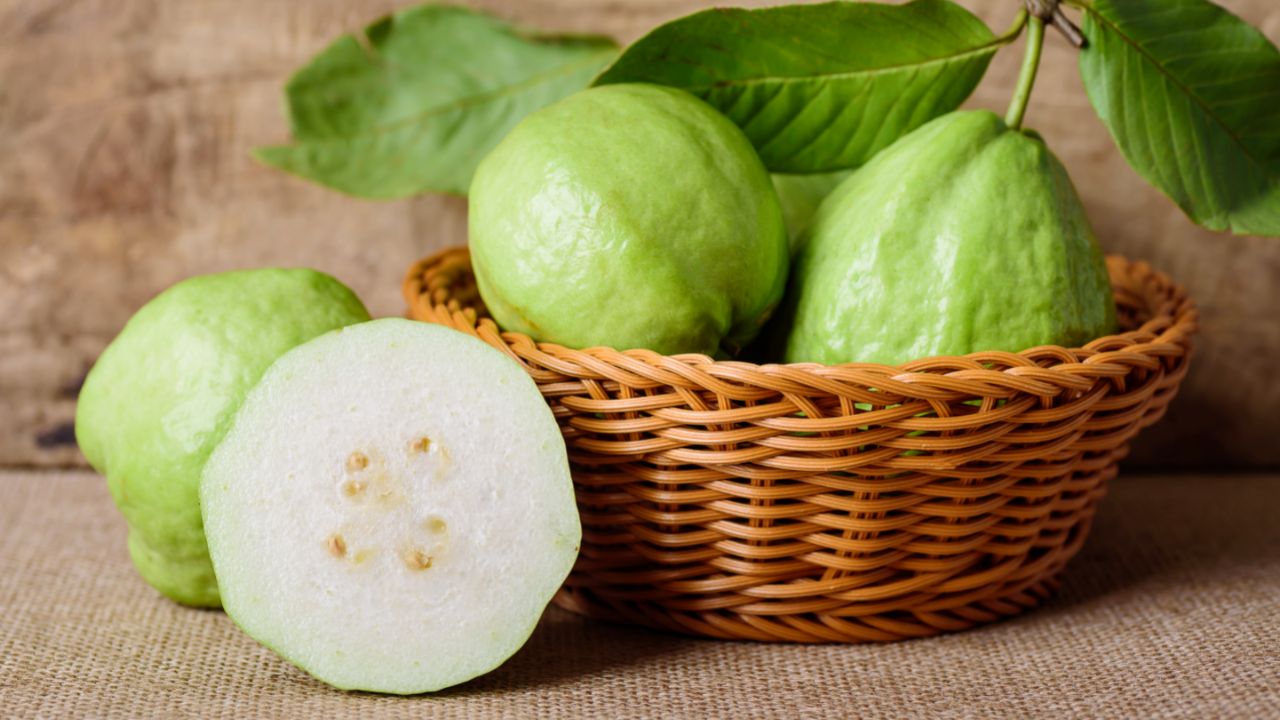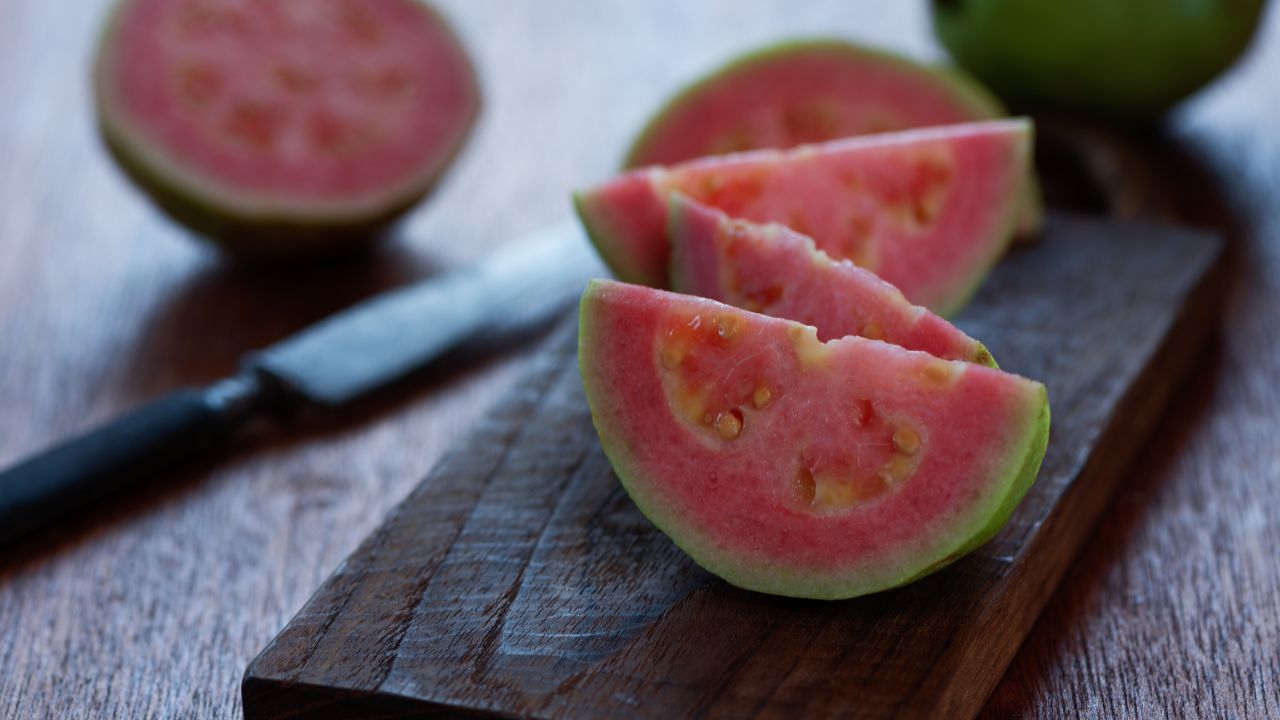Some people say that when it comes to guavas, you either love them or hate them. This is down to the fact that they have quite a unique, tangy taste.
If you are thinking of trying guava but are curious as to what to expect when you bite into one, then keep reading.

What Is Guava?
Guava has been cultivated in South America and Peru since the eighteenth century.
However, American Indians are reported to have grown guava in Northern Florida in the early 1800s.
Guava is currently grown in nearly every tropical and subtropical region of the world, and it is enjoyed in nearly every country.
One of its most noticeable aspects is the variety of guava kinds offered. Guavas are available in a variety of types, each with its unique set of characteristics.
Some guavas, for example, might be as little as a lemon and grow as large as a grapefruit (see also ‘Pomelo Fruits: Taste, Benefits And Cooking Tips‘). Color varies according to variety.
When unripe, guava is a vivid green. Its hue when ripe varies according to the variety.
Some guavas become pinkish, while others turn crimson, orange, or yellowish.
Different Types Of Guavas
Despite the fact that there are numerous types, all guavas appear the same.
These guava species have rough exterior surfaces and are mainly green, red, pinkish, and yellow.
Here are just a few examples of the many different types of guavas:
Tropical White Guava
This guava is one of the most widely available. It has a spherical form, tough skin, and milky white meat.
This guava has no significant aroma, yet it is incredibly juicy and delicious.
Tropical white guavas are native to Mexico, although they may be found across the Pacific tropics, Asia, and Africa.
Because it has a soft and juicy flesh, you may eat it like an apple or add it to salads or smoothies.
Red Indian Guava
The Red Indian guava is a must-see if you’re seeking variety. They have pink, luscious flesh with golden veins.
When you bite into it, you’ll notice a sweet-sour flavor on your tongue, which is rather intriguing.
The peel of this guava is yellow, the inside is full with seeds, and the aroma is rather powerful.
However, you must wait until the fruit is fully mature before eating it. Otherwise, you’ll simply get resentment.
Pineapple Guava
This guava is egg-shaped and is yellowish-green or light green in hue. When fully ripe, it has a powerful scent and begs you to eat.
This guava will capture anyone’s heart with its creamy-white flesh and sweetness.
The meat is neither overly tough or sensitive, so the texture feels great in your mouth.
Strawberry Guava
The name comes from the fact that this guava tastes similar to strawberries (see also ‘What Do Strawberries Taste Like?‘). They are oval in form and contain transparent flesh with several firm seeds.
When it’s fresh, the skin is greenish, and it gradually turns maroon or dark green. Strawberry guava pairs well with any flavor of raspberry.
How Do You Eat Guava?
To consume a guava, just rinse it and dig in, eating both the seeds and the rind.
Guava is so packed with vitamin C that the peel alone has more than an orange.
If you want to cut the guava, set it on a cutting board and slice it in half. Similar to an apple, slice it into wedges.
If you do not want to eat the peel, cut the guava in half and use a spoon to scoop the fruit from the rind, as you would with an avocado.
The meat can then be cut into pieces if you prefer. Pink fleshed guavas are more common than white fleshed guavas.
They occasionally contain harder seeds that you may find unpleasant, but they are fully edible.
These may be removed using your fingers or the sharp end of a knife. They can also be used in the kitchen.
Guavas have a high pectin content, which is a naturally occurring component in fruit that aids in the thickening of jams and pies.
As a result, guava is excellent for preparing jams or fruit pastes that may be spread over toast, paired with meat, or folded into pastries.
This summer, you might also prepare a guava glaze to go with grilled shrimp.
What Does Guava Taste Like?
Ripe guava has a sweet and musky aroma. It has a particular taste that virtually everyone like.
The flavor is often described as a mix between a pear and a strawberry. Ripe guava feels somewhat soft and has a little strong fragrance.
A guava’s pulp is delicate and sweet. Some claim it tastes like papaya (see also ‘How To Tell If A Papaya Is Ripe‘), except for the seeds.
Others compare its texture to a pear. Guava pulp is dense but soft enough to consume whole.
Guava flavor varies based on who you ask and what sort of fruit they’ve eaten. The overall consensus on guava flavor is that it is a pleasant and healthy fruit (see also ‘What Does A Persimmon Actually Taste Like? Does Persimmon Even Taste Good?‘).
Guava is said to taste like a mix between strawberries and pears, however the sweet flavor varies according to the cultivar.
Health Benefits Of Guava
Guava can be used as a way to treat a variety of health issues.
Research has found that guava fruits and leaves may provide many health advantages, here are some of these benefits.
Boosts Immunity

Guavas are an excellent source of vitamin C. Guava fruit (see also our article on dragon fruit) has about four times the vitamin C level of oranges.
Vitamin C is found to boost immunity and protect you from common diseases and viruses. It also maintains your eye function and overall health.
Reduces The Risk Of Cancer
Quercetin, lycopene, vitamin C, and other polyphenols are powerful antioxidants that neutralize free radicals produced in the body, limiting cancer cell proliferation.
Due to it being high in lycopene, guava fruit has been demonstrated to be effective in lowering the risk of prostate cancer and inhibiting the formation of breast cancer cells.
Fights Diabetes
Guava is an anti-inflammatory food that also contains potassium, fiber, vitamin C, and antioxidants.
These minerals are included in guava aid in the regulation of blood insulin levels, pancreatic functioning, and other diabetes-related issues.
When pancreatic functions are impaired, blood sugar cannot be stored in cells; guava has nutrients that help to keep it in balance and battle diabetes causes.
Furthermore, low glycemic index meals are better for your health because they have less calories and give more nourishment.
Guava has the property of being easily digestible. It is also gradually absorbed in the stomach, which prevents glucose levels from rising.
It causes a steady rise in blood glucose levels, which aids in diabetes management.
Good For The Heart
Guava fruit improves the salt and potassium balance in the body, consequently lowering blood pressure in hypertensive individuals.
Guavas also help decrease triglyceride and LDL cholesterol levels, both of which contribute to the development of heart disease.
This mystical fruit raises excellent cholesterol levels (HDL).
Improves Eyesight
Guava is well recognized as an eyesight health enhancer due to the presence of Vitamin A.
It can not only prevent vision deterioration, but also improve vision. It can assist to delay the onset of macular degeneration and cataracts.
Guavas, while not as high in Vitamin A as carrots, are nevertheless a solid source of the vitamin.
Reduces Stress
One of the numerous advantages of guava is that the magnesium in the fruit helps to calm the body’s muscles and nerves.
So, after a strenuous workout or a long day at the workplace, a guava is unquestionably what you want to relax your muscles, battle tension, and provide your system with an energy boost.
How To Properly Store Guava?
If you bought a guava that is still rather solid, let it mature for a few days on the counter (out of direct sunshine).
Enjoy the guava right away or put it in the crisper drawer after it begins to yield slightly under pressure and begins to smell robust and delicious.
Put your guava in a plastic or paper bag that is securely closed before storing it in the refrigerator.
It will be shielded from other fruits that can hasten ripening as a result.
You should consume the fruit as soon as possible once it reaches full maturity, even if you store it safely.
The shelf life of the guava is short, like that of many tropical fruits. Guavas can be frozen, although the process is complex.
The fruit must first be peeled before being thoroughly immersed in a solution of plain water and simple syrup.
The guava may be frozen for up to a year in an airtight container while still soaked.
Where Does Guava Come From?
Guava fruit grows on a very small tree with a short canopy and a robust trunk.
The tree in which guavas grow on is an intriguing plant with bark that is greenish and mottled with long serrated leaves measuring three to seven inches.
Guava trees have white 1-inch blossoms that give way to tiny round, or pear-shaped fruits.
These fruits are more precisely berries with soft flesh that can be white, yellow, red, or pink, and that can range in flavor from sour, acidic, to sweet and rich depending on the type.
Growing Your Own Guava
Growing guava from seed can take up to eight years to produce a fruiting tree, and the seedlings are not faithful to the parent.
As a result, cuttings and layering are more commonly utilized as guava fruit tree propagation strategies.
Growing guava seeds, on the other hand, is a pleasant activity that results in an unusual plant.
Harvest the seed from a fresh guava fruit and soak away the flesh.
Although the seeds may be stored for months, germination can take up to about eight weeks.
The seeds need to be boiled for five minutes before planting to soften the stiff outer layer and promote germination.
Summary
Overall, the guava fruit may not be as well known as the apple or banana, but they are definitely little gems of juicy wonder that taste like somewhere between a pear and strawberry whilst having a very unique taste of its own.
There are also lots of ways that eating guava will benefit your health such as improving your eyesight and controlling your sugar levels if you have diabetes.
If you find that you absolutely love the taste of guava or love to use them in your cooking and baking, then you can even have a go of growing guava trees in your own backyard.
- 15 Traditional Greek Breads - July 31, 2023
- 30 Delicious And Gluten-Free Cookie Recipes - July 29, 2023
- 30 Of The Best European Desserts - July 29, 2023
